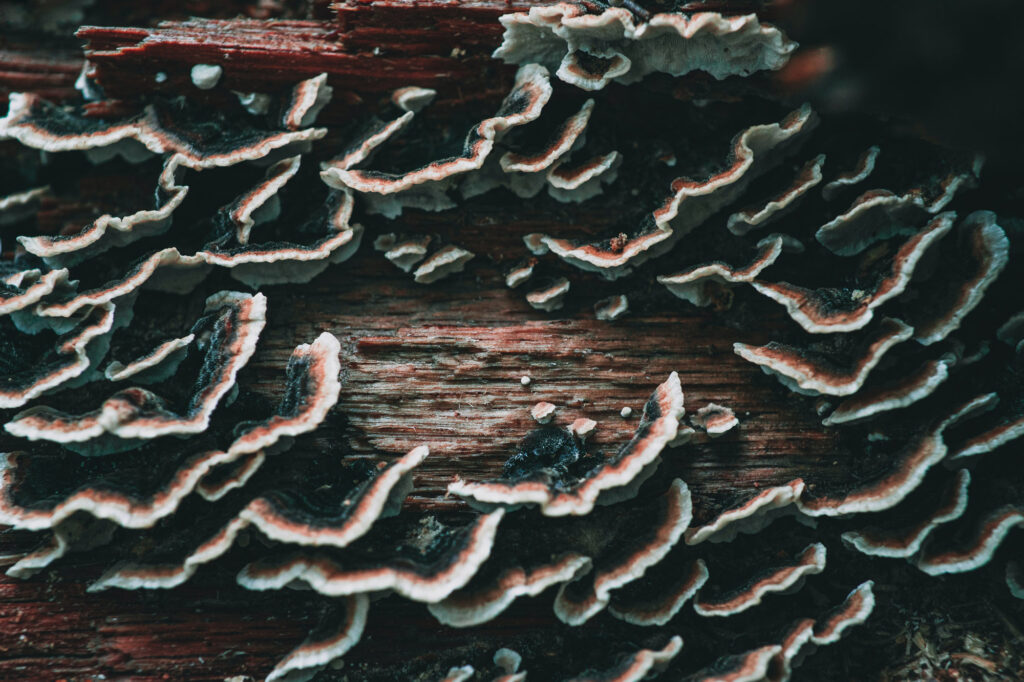Examining the Coriolus Mushroom (Turkey Tail Mushroom) in Cancer Care

Capturing the attention of scientists and traditional healers alike, the unassuming coriolus mushroom has a distinctive fan-shaped cap with vibrant rings reminiscent of a turkey’s tail feathers. In fact, it is often called the turkey tail mushroom. Nestled within the heart of forests around the world, several cultures have harnessed the therapeutic potential of these mushrooms and modern science has shed light on their remarkable properties. Emerging studies have delved into the potential role of the main constituents of the coriolus mushroom, including PSK (polysaccharide-K) and PSP (polysaccharide peptide), and show promise as adjunctive therapy to conventional cancer care.
Turkey Tail Mushroom and Overall Cancer Survival
A notable feature of coriolus mushrooms is the capacity to increase overall survival in cancer. A systematic review and meta-analysis published in 2019, involving data from 13 randomized control clinical trials and 2,587 patients diagnosed with cancer, demonstrated significant survival advantage for those taking the mushroom adjunctively with standard of care treatment. [[i]] Another review in 2015 evaluated 28 studies and showed improvement of various survival measures, including median, 1-, 2- and 5-year survival, in lung cancer. [[ii]] More specifically, in advanced hepatocellular carcinoma, a small randomized clinical trial involving 15 patients no longer eligible for conventional care revealed an improvement in median overall survival from 2.2 months to 6.5 months in the group taking coriolus mushroom. [[iii]] Lastly, a separate meta-analysis involving 1,094 patients with curatively resected colon cancer showed benefit in overall and disease-free survival over chemotherapy alone. [[iv]]
The coriolus mushrooms exerts mechanistic action in cancer by optimizing the effects of the immune system. In 2015, a clinical trial involving individuals with breast cancer having completed treatment, showed a significant increase in absolute counts of B- and T-lymphocytes. [[v]] In other words, a strong supportive mechanism was identified for cancer preventative measures. An increase in natural killer cell function and decrease in immunosuppressive proteins was also identified in patients with stage II or III colorectal cancer when taking coriolus mushrooms. [[vi]] Lastly, a phase II clinical trial showed patients with non-small cell lung carcinoma who were concurrently supplementing with coriolus mushroom alongside conventional chemotherapeutics showed a significant improvement in overall white blood cell count. [[vii]]
Learn More About Integrated Cancer Support at NatureMed
The story of the coriolus mushroom continues to unfold as the intricate synergy between traditional wisdom and modern medicine is further explored. However, current research confirms coriolus mushrooms offers improvements in overall survival and immune system function in patients at various stages in their cancer care journey.
[i] Zhong L, Yan P, Lam WC, Yao L, Bian Z. Coriolus Versicolor and Ganoderma Lucidum Related Natural Products as an Adjunct Therapy for Cancers: A Systematic Review and Meta-Analysis of Randomized Controlled Trials. Front Pharmacol. 2019 Jul 3;10:703. doi: 10.3389/fphar.2019.00703. PMID: 31333449; PMCID: PMC6616310.
[ii] Fritz H, Kennedy DA, Ishii M, Fergusson D, Fernandes R, Cooley K, Seely D. Polysaccharide K and Coriolus versicolor extracts for lung cancer: a systematic review. Integr Cancer Ther. 2015 May;14(3):201-11. doi: 10.1177/1534735415572883. Epub 2015 Mar 17. PMID: 25784670.
[iii] Chay WY, Tham CK, Toh HC, Lim HY, Tan CK, Lim C, Wang WW, Choo SP. Coriolus versicolor (Yunzhi) Use as Therapy in Advanced Hepatocellular Carcinoma Patients with Poor Liver Function or Who Are Unfit for Standard Therapy. J Altern Complement Med. 2017 Aug;23(8):648-652. doi: 10.1089/acm.2016.0136. Epub 2017 Apr 4. PMID: 28375640.
[iv] Sakamoto J, Morita S, Oba K, Matsui T, Kobayashi M, Nakazato H, Ohashi Y; Meta-Analysis Group of the Japanese Society for Cancer of the Colon Rectum. Efficacy of adjuvant immunochemotherapy with polysaccharide K for patients with curatively resected colorectal cancer: a meta-analysis of centrally randomized controlled clinical trials. Cancer Immunol Immunother. 2006 Apr;55(4):404-11. doi: 10.1007/s00262-005-0054-1. Epub 2005 Aug 20. PMID: 16133112.
[v] Wong CK, Bao YX, Wong EL, Leung PC, Fung KP, Lam CW. Immunomodulatory activities of Yunzhi and Danshen in post-treatment breast cancer patients. Am J Chin Med. 2005;33(3):381-95. doi: 10.1142/S0192415X05002990. PMID: 16047556.
[vi] Ohwada S, Ogawa T, Makita F, Tanahashi Y, Ohya T, Tomizawa N, Satoh Y, Kobayashi I, Izumi M, Takeyoshi I, Hamada K, Minaguchi S, Togo Y, Toshihiko T, Koyama T, Kamio M. Beneficial effects of protein-bound polysaccharide K plus tegafur/uracil in patients with stage II or III colorectal cancer: analysis of immunological parameters. Oncol Rep. 2006 Apr;15(4):861-8. PMID: 16525672.
[vii] Tsang KW, Lam CL, Yan C, Mak JC, Ooi GC, Ho JC, Lam B, Man R, Sham JS, Lam WK. Coriolus versicolor polysaccharide peptide slows progression of advanced non-small cell lung cancer. Respir Med. 2003 Jun;97(6):618-24. doi: 10.1053/rmed.2003.1490. PMID: 12814145.

